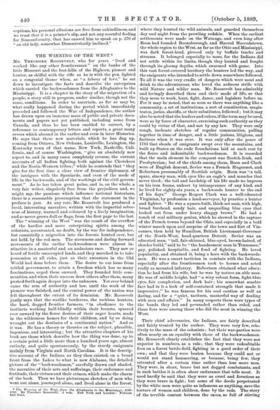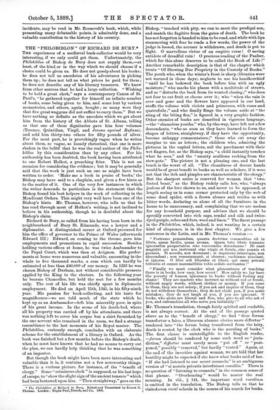THE WINNING OF THE WEST.*
MR. THEODORE ROOSEVELT, who for years "lived and worked like any other frontiersman" on the banks of the little Missouri and the foot-hills of the Bighorn, pioneer and hunter, as skilful with the rifle as he is with the pen, lighted on a congenial theme when, as "a labour of love," he sat down to investigate the facts and describe the enterprises which carried the backwoodsmen from the Alleghanies to the Mississippi. It is a chapter in the story of the migration of a people, a story still in progress, under similar, though not the same, conditions. In order to ascertain, as far as may be, what really happened during the period which immediately preceded and followed the War of Independence, the author has drawn upon an immense mass of public and private docu- ments and papers not yet published, including some from Canada, and thus he has been enabled to correct, by a reference to contemporary letters and reports, a great many errors which abound in the earlier and even in later Histories. He says that these new materials, which he has dug up, coming from Ottawa, New Orleans, Louisville, Lexington, the Kentucky town of that name, New York, Nashville, Cali. fornia, and of course Washington, " give an absolutely new aspect to, and in many cases completely reverse, the current accounts of all Indian fighting, both against the Cherokees and the North-Western tribes ;" while he contends that " they give for the first time a clear view of frontier diplomacy, of the intrigues with the Spaniards, and even of the mode of life in the backwoods, and of the workings of the civil govern- ment." As he has taken great pains, and is, on the whole, a very fair writer, singularly free from the prejudices and, we might say, the passions which influence national historians,
there is a reasonable presumption that the statement in the preface is just. At any rate, Mr. Roosevelt has produced a lucid, interesting narrative, written with the impartial sober- ness of history, warmed and coloured by a lively imagination, and so never grows dull or flags, from the first page to the last.
The " winning of the West " was the result of the overflow of the hardier and more enterprising spirits among the colonists, accentuated, no doubt, by the war for independence, but essentially a migration into the forests hunted over, but not held, by the red men. The strenuous and daring forward movements of the earlier backwoodsmen were almost in- stinctive in a masterful and an audacious race. They saw or heard of fertile unoccupied lands, and they marched in to take possession at all risks, just as their ancestors in the Old World had done before them. The desire to cut loose from settled government, to attain a freedom which has so many fascinations, urged them onward. They founded little com- munities, and when their success drew others after them, many pushed forth again deeper into the unknown. Yet ever behind came the arm of authority and law, until the work of the pioneer was finished, and the central power of the nation was felt throughout the extent of its dominion. Mr. Roosevelt justly says that the warlike borderers, the reckless hunters, the hard, dogged frontier farmers, " in obedience to the instincts working half-blindly within their breasts, spurred ever onward by the fierce desires of their eager hearts, made in the wilderness homes for their children, and by so doing wrought out the destinies of a continental nation." And so it was. He has a theory or theories on the subject, plausible, ingenious, and interesting ; but the attractive chapters of his book are those which describe how the thing was done, up to a certain point a little more than a hundred years ago, almost entirely, and quite spontaneously, by the sturdy emigrants mainly from Virginia and North Carolina. It is the descrip- tive account of the Indians as they then existed, on a broad front from the Lakes to what is now Alabama, the detailed picture of the "backwoodsmen," carefully drawn and shaded, the narrative of their acts and sufferings, their endurance and fortitude, their virtues and their crimes, which make the charm of the book. Then we have picturesque sketches of men who went out alone, journeyed alone, and lived alone in the forest,
• The Winning of the West, from the Alleghenies to the Mississippi, 1789- 1789. By Theodore Roosevelt. 2 'vols. New York and London: Putnam and Sons.
where they hunted the wild animals, and guarded themselves day and night from the prowling redskin. When the earliest settlements were made on the Watauga, and even long after Boon had founded Boonsborough, and Harrod Harrodstown, the whole region to the West, as far as the Ohio and Mississippi, was dark forest-land, pierced only by buffalo tracks and streams. It belonged especially to none, for the Indians did not settle within its limits, though they hunted and fought through its gloomy depths, which swarmed with game. Into this vast forest-covered territory the hunters led the way, and the emigrants who intended to settle down somewhere followed. To all it was the very cradle of dangers which were meat and drink to the adventurous, who loved the arduous strife with wild Nature and wilder man. Mr. Roosevelt has admirably and lovingly described them and their mode of life, so that they seem to work, hunt, fight, dance, and legislate before us. For it may be noted, that so soon as there was anything like a community, a set of institutions, a sort of constitution, magis- trates, juries, sheriffs, or their substitutes, followed ; but it may also be noted that the leaders and rulers, if the term may be used, were so by force of character, exercising such authority as they could by virtue of that, and not by any law. They were only rough, inchoate sketches of regular communities, pulling together in time of danger, and a little jealous, litigious, and factious when it was over. It was only after the peace of 1783 that shoals of emigrants swept over the mountains, and built up States on the rude foundations laid at such cost by the fierce and indomitable backwoodsmen. It is recorded that the main element in the conquest was Scotch-Irish, and Presbyterian; but of the chiefs among them, Boon and Clark were of English descent, Sevier was a French Huguenot, and Robertson presumably of Scottish origin. Boon was "a tall, spare, sinewy man, with eyes like an eagle's and muscles that never tired ; the toil and hardship of his life made no impress on his iron frame, unhurt by intemperance of any kind, and he lived for eighty-six years, a backwoods hunter to the end of his days." George Rogers Clark was a well-educated Virginian, by profession a land-surveyor, by practice a hunter and fighter. " He was a square-built, thick-set man, with high, broad forehead, sandy hair, and unquailing blue eyes that looked out from under heavy shaggy brows." He had a touch of real military genius, which he showed in the capture of the French towns beyond the Ohio, and especially in a bold winter march upon and surprise of the town and fort of Vin- cennes, then held by Hamilton, British Lieutenant-Governor of the North-West, head-quarters Detroit. Sevier was an educated man, " tall, fair-skinned, blue-eyed, brown-haired, of slender build," said to be " the handsomest man in Tennessee," gay, polished, hospitable, and fond of fighting. He loved popularity, and obtained it, being a hero with the backwoods- men. He was a smart tactician in combats with the Indians, especially after the " frontiersmen took to horses and acted really as mounted infantry. Robertson obtained what educa- tion he had from his wife, but he was by nature an able man.
He was of middle height, had " a wiry robust form, light-blue eyes, fair complexion, and dark hair ; his somewhat sombre face had in it a look of self-contained strength that made it impressive ;" he was famous for his cool caution as well as daring, and for a "quiet, taciturn, masterful way of dealing with men and affairs." In many respects these were types of the bands they led and persuaded rather than ruled, and these four were among those who did the most in winning the West.
Their chief adversaries, the Indians, are fairly described and fairly treated by the author. They were very few, rela- tively to the mass of the colonists ; but their war-parties were often nearly on an equality with those of the backwoodsmen. Mr. Roosevelt clearly establishes the fact that they were not superior in numbers, as a rule; that they were redoubtable foes on a forest battle-field, fighting in a good order of their own ; and that they were beaten because they could not or would not stand hammering, or because, being few, they retreated after a certain time rather than lose more men. They were, in short, brave but not dogged combatants, and in such battles it is often sheer endurance that tells most. It need hardly be said that they were as cruel and ferocious as they were brave in fight ; but some of the deeds perpetrated by the white men were quite as infamous as anything, save the torture of women and children, done by the reds. The story of the terrible contest between the races, so full of stirring
incidents, may be read in Mr. Roosevelt's book, which, while presenting many debateable points, is admirably done, and a valuable contribution to the history of his country.







































 Previous page
Previous page